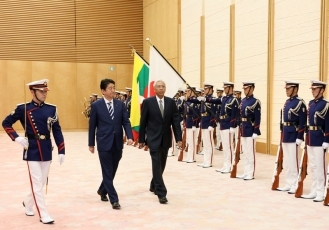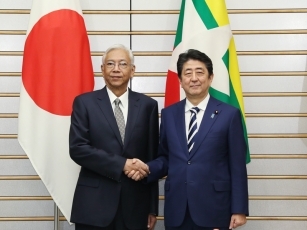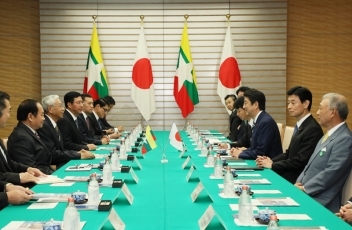Japan-Myanmar Relations
Prime Minister Shinzo Abe Meets with the President of Myanmar
 Photograph of the salute and the guard of honor ceremony
Photograph of the salute and the guard of honor ceremony (Photo: Cabinet Public Relations Office)
 Photograph of the Prime Minister shaking hands with
Photograph of the Prime Minister shaking hands with the President of Myanmar
(Photo: Cabinet Public Relations Office)
 Photograph of the Japan-Myanmar Summit Meeting
Photograph of the Japan-Myanmar Summit Meeting (Photo: Cabinet Public Relations Office)
On December 14, commencing at 6:10 p.m. for approximately 40 minutes, Mr. Shinzo Abe, Prime Minister of Japan, held a meeting with H.E. Mr. Htin Kyaw, President of the Republic of the Union of Myanmar, during his visit to Japan. The overview of the meeting is as follows. Additionally, the meeting was attended by Mr. Yasutoshi Nishimura, Deputy Chief Cabinet Secretary, Mr. Yohei Sasakawa, Special Envoy of the Government of Japan for National Reconciliation in Myanmar, and others. Following the meeting, Prime Minister Abe and President Htin Kyaw held a joint press statement, and Prime Minister Abe and Mrs. Abe then hosted a dinner. Approximately 60 invitees who have ties with Myanmar attended the dinner, and the conversations covered a broad range of issues related to strengthening the relationship between the two countries, in a very friendly atmosphere.
1. Opening remarks
Prime Minister Abe welcomed President Htin Kyaw, thanked him for attending the Universal Health Coverage (UHC) Forum 2017, and explained that he is aware President Htin Kyaw has deep ties to Japan that date from his father’s era, and that together with the President he intends to advance the traditionally friendly relationship with Myanmar. Prime Minister Abe appreciated that Myanmar’s current administration is moving forward with building a democratic nation, explained that Japan will continue to provide its full support by bringing together the public and private sectors, and stated that he will support the peace process with the cooperation of Special Envoy Sasakawa, who also attended the meeting. In response, President Htin Kyaw expressed thanks for Japan’s warm hospitality, and stated that he is grateful for the invitation to visit, including the invitation to this UHC Forum. President Htin Kyaw explained that the support for the peace process being extended by the Government of Japan and Special Envoy Sasakawa is significant and he expressed his appreciation and gratitude, along with requesting continued support.
2. Universal Health Coverage (UHC)
Prime Minister Abe expressed thanks for the address President Htin Kyaw gave at the UHC Forum 2017, explained that Myanmar is a priority country for Japan’s UHC support, and will support the realization of UHC. Additionally, Prime Minister Abe stated that in order to realize UHC, Japan will support the establishment of regional general hospitals in Dawei and elsewhere, and a specialist hospital in Yangon. Furthermore, Prime Minister Abe explained that together with technical support in such areas as regional basic health, infectious diseases and medical engineers, Japan will also implement fine-tuned support, and is scheduled to provide equipment essential to establishing a blood bank in Rakhine State in January next year. In response, President Htin Kyaw stated that the Government of Myanmar is pursuing initiatives with the aim of achieving UHC in 2030, and expressed thanks for Japan’s support in the health field.
3. Bilateral cooperation
Prime Minister Abe stated the following:
(1) Under the Free and Open Indo-Pacific Strategy, Japan intends to contribute to the stability and prosperity of Myanmar and the region as a whole as a result of enhancing regional connectivity and other initiatives.
(2) Concerning contributions totaling JPY800 billion from Japan’s public and private sectors, Japan will pick up the pace of cooperation centering on the development of Yangon City, transportation and electricity.
(3) In order to promote cultural exchanges, Japan is preparing to provisionally establish the Japan Foundation, Yangon this fiscal year. Taking this opportunity, Japan intends to strengthen support for Japanese language learning through initiatives such as cooperating on teacher training.
In response, President Htin Kyaw expressed gratitude for Japan’s support while acknowledging that the various supports from Japan are important to Myanmar’s nation-building. Furthermore, President Htin Kyaw asked that Prime Minister Abe and Mrs. Abe visit Myanmar, and Prime Minister Abe replied that he hopes to visit at an appropriate time.
4. Situation in Rakhine State
(1) Prime Minister Abe explained that he is concerned about the human rights and humanitarian situation in Rakhine State, and stated that he expects the Government of Myanmar continues its own investigation into alleged human rights violations and takes necessary measures. Prime Minister Abe stated that he hopes progress will be made with the Government of Myanmar’s efforts to restore security with full respect for human rights, expand access for humanitarian support and return and resettle displaced persons, and encouraged further efforts by the Government of Myanmar to steadily implement the recommendations in the report from Annan’s Advisory Commission which is also important. In addition, Prime Minister Abe explained that he was encouraged that H.E. Ms. Aung San Suu Kyi, State Counsellor of Myanmar, spoke of “achieving results and showing them to the international community,” and said he hopes the Government of Myanmar will transparently present progress with its initiatives to the international community, and expects that they will be steadily implemented. Furthermore, Prime Minister Abe welcomed the Myanmar-Bangladesh agreement on repatriation.
(2) In response, President Htin Kyaw expressed gratitude for Japan’s understanding of the difficult situation in Rakhine State, explained that he is aware the international community attaches importance to the investigation on alleged human rights violations, and stated that if the investigation finds evidence of human rights violations the Government of Myanmar will respond appropriately and according to the law. President Htin Kyaw also explained that the Government of Myanmar is moving to implement the Annan Advisory Commission’s recommendations and understands the concerns being expressed by the international community including Japan, and stated that Myanmar is responding accordingly.
(3) Following that, Prime Minister Abe stated that Japan will implement immediate support by paving the road between Maungdaw and Rathedaung in Rakhine State, and explained that Japan also intends to establish a power line approximately 35 kilometers north from Maungdaw City in order to broadly supply electricity to people in the border region. With regard to education also, Prime Minister Abe announced that Japan will build around 15 schools. Furthermore, Prime Minister Abe stated that private-sector support is also beginning to increase, and noted that Japanese companies are participating in projects in the telecommunications field. Prime Minister Abe stated that the public and private sectors will together support peace and stability in Rakhine State.
(4) In response, President Htin Kyaw expressed gratitude for Japan’s support.
5. Challenges in the regional and international arenas
With regard to North Korea, the two leaders shared the view that they will maximize pressure on North Korea by all means and together will strengthen efforts to resolve North Korean issues. Prime Minister Abe called for understanding and cooperation on the abductions issue, and obtained President Htin Kyaw’s understanding.

